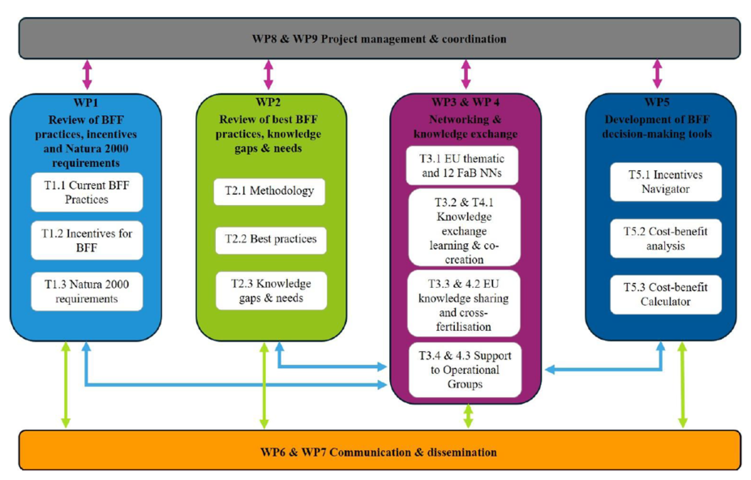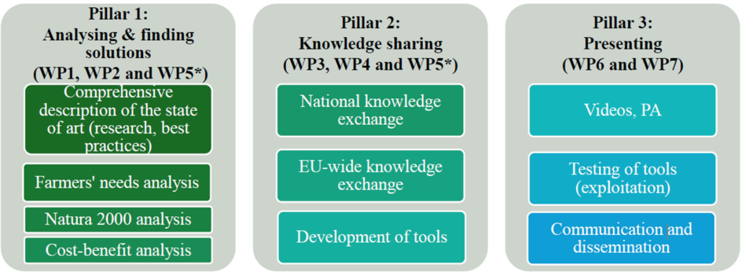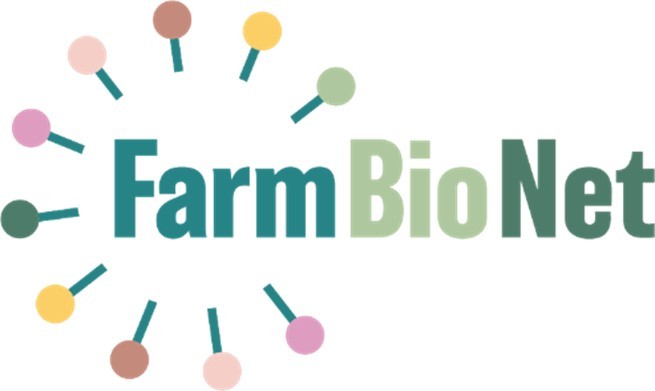Project number: European Union’s Horizon Europe Framework Programme under project No. 101082102. Grant agreement ID: 101182942.
Project duration: 1. 1. 2025 - 31. 12. 2027
Overall budget: 2.999.508,13 €
Co-financing: 100 % European Union’s Horizon Europe Framework Programme
Lead partner: TEAGASC - AGRICULTURE AND FOOD DEVELOPMENT AUTHORITY, Ireland
About the project
FarmBioNet is dedicated to bridging the knowledge gap between biodiversity and agriculture, aiming to promote Biodiversity-Friendly Farming (BFF) practices across Europe.
The beneficial links between biodiversity and agriculture have not yet been adequately communicated to farmers and foresters, thereby creating reluctance in the uptake of biodiversity-friendly farming (BFF) practices, including in Natura 2000 sites. FarmBioNet will address this knowledge gap in European farming and forestry. The FarmBioNet consortium combines the expertise of natural and social scientists, farmer organisations, SMEs, NGOs, businesses, and Ministries in 13 countries (11 member states).
FarmBioNet will promote Europe-wide knowledge exchange and integration of research findings and practices related to farmland biodiversity, especially inside Natura 2000 sites, including those relevant to climate change mitigation/adaptation and soil health. It will evaluate and refine measures, and develop and use cross-sectoral approaches, to collect and distribute, at national and European level, easily accessible, practice-oriented, and context specific knowledge on BFF practices.
Central to FarmBioNet is the establishment of Farming and Biodiversity National Networks (NNs), consisting of farmer/forester individuals and organisations, researchers, NGOs, advisors, and other relevant AKIS actors. FarmBioNet will use these NNs to gather and disseminate knowledge and information. NNs will use BFF case-study areas to promote exchange of traditional and evidence-based actions that benefit farm biodiversity, through a cocreation and cross-fertilisation process. Cost-benefit analyses, showing how biodiversity can benefit sustainable food production, and development of practical decision-making tools will promote biodiversity with farmers and foresters, and local, regional and national policy makers.
FarmBioNet aims to position Europe as a global leader for biodiversity-friendly farmland management practices, harnessing knowledge to protect biodiversity and the ecosystem services it provides, which are vital to sustainable land management and bring wider societal benefits.
Work packages


More information about the project:
- Website: www.farmbionet.eu/
- Linkedin: www.linkedin.com/company/farmbionet/
- FB: www.facebook.com/people/Farmbionet/61570091162377/
- YouTube: www.youtube.com/@FarmBioNet
- IG: https: www.instagram.com/farmbionet/

